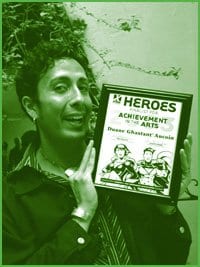A gay Vancouver artist says his human rights were violated by a Whitehorse cab company whose driver kicked him out when he kissed another man.
Now, Duane Aucoin wants a public apology from Yellow Cab.
And, says Aucoin, if he doesn’t get it, he’s going to file a human rights complaint with the Yukon territorial government.
Aucoin was with two friends in a Whitehorse Yellow Cab after being at a bar early on Sep 11. The trio pulled in at a convenience store and one of the men went in.
That’s when Aucoin and the other man began kissing. The cabbie ordered them out of the car and sped off.
Aucoin, a former official with the Yukon’s Teslin-Tlingit council, says he immediately called the cab company to inquire about a bag they thought they’d left in the vehicle.
He says the female dispatcher asked him if they were the ones who fled the cab without paying. He was shocked to hear the accusation.
When Aucoin explained the situation, the woman said she’d be uncomfortable with the pair’s actions as well. Before Aucoin could say anything else, she hung up on him, he says.
“I couldn’t believe it,” Aucoin says. “I again felt like I did 20 years ago, when I first came out of the closet in Whitehorse-when I was made to feel ashamed of being gay. The homophobia I faced then was daily and in my face and, sadly, not much has changed in 20 years. Just now they don’t say ‘faggot’ when they kick you out of cabs or hang up on you.”
Cab company operator Graham Jackson had not heard of the situation.
“I’d have to acknowledge it happened to apologize,” he says. “I’d have to check that out.”
According to City of Whitehorse records, Jackson represents Fifth Avenue Taxi, Yellow Cabs, and Whitehorse Taxi.
Yukon human rights legislation prohibits discrimination in the provision of goods and services to anyone based on sexual orientation.
Aucoin says he was proud of the Yukon government when it recognized the rights of gays to marry earlier this year. But, he adds, that’s worthless if society still discriminates in other ways.
“This does no good if society still makes us feel dirty for who we are. If people try to say that they are okay with people being gay as long as they don’t express it publicly, that is still discrimination,” Aucoin says.
He compares his situation to that of US civil rights activist Rosa Parks, the black woman in Selma, Alabama who refused to move to the back of a bus.
“I felt totally violated. There’s no way I’m going to let this go. He violated my rights.”
The Yukon Human Rights Act also says employers are responsible for the conduct of their employees, unless the employer did not consent to the conduct or took care after learning of the conduct and tried to rectify the situation.
Aucoin believes that because the dispatcher hung up on him, the cab company remains in violation of the law.
Aucoin says he believes the cab company will attempt to say the cabby will assert that the gay men were drunk and unruly. It’s not the case he says.
“He didn’t even explain why he was kicking us out,” Aucoin says. “I was too much in shock to ask.”
Yukon Human Rights Commission investigator Bruce Whittington says the commission tries to resolve disputes and does not make findings of fact. If there appears to be grounds for a complaint to proceed, it moves to a board of adjudicators that can assess penalties.
“Human rights law does say an employer has quite serious responsibilities in terms of making an environment that is free of discrimination,” he says. “The employer is not necessarily liable in a situation where an employee does something that is discriminatory.”
Given the wide variety of arrangements between cabbies and cab companies, a driver may not even be considered an employee under law. So, it’s not clear whether Aucoin ought be pressing a case against the driver or the cab company.

 Why you can trust Xtra
Why you can trust Xtra


